
Prime Minister Benjamin Netanyahu is Israel's longest-serving leader, but his era appeared late Wednesday to be nearing an end as opposition leader Yair Lapid said he could form the next government.
Here is a look back at Netanyahu's career since he returned to the premiership in 2009:
The right-wing Likud party chief becomes prime minister for a second time in March 2009, after a first stint between 1996 and 1999.
He forms a coalition firmly anchored in the right, with ultra-nationalist Avigdor Lieberman as foreign minister.
After snap polls in January 2013, Netanyahu forms a new coalition with hardliners keen to build settlements on Palestinian land seized during the 1967 Six-Day War.
Also read: Israel set for a change of government?
In July 2014, Israel launches a military operation against the Hamas-run Gaza Strip with the stated aim of ending rocket fire and destroying tunnels used for smuggling.
The war -- the third in Gaza since 2008 -- leaves 2,251 dead on the Palestinian side, mostly civilians, and 74 on the Israeli side, mostly soldiers.
In May 2015, Netanyahu wins a confidence vote in parliament for his fourth government.
A year later, he signs a coalition agreement with the Yisrael Beitenu party, naming its chief Lieberman as defence minister.
The government is the most right-wing in Israeli history with ultra-orthodox MPs in the cabinet.
In June 2017, Israel starts building its first new government-sanctioned settlement in the occupied Palestinian territories since 1991, in defiance of international opinion.
Mass protests erupt in Gaza in March 2018, demanding the right to return to homes in Israel that Palestinians fled or were expelled from after the creation of the Jewish state in 1948.
The protests spark a surge in violence on the border, where Palestinians gather every Friday.
From March 2018 to December 2019, at least 352 Palestinians are killed by Israeli fire. Eight Israelis also die in related incidents.
In April 2019, Likud wins 35 of the 120 parliamentary seats in a general election, the same number as Netanyahu's centrist challenger Benny Gantz.
Netanyahu is tasked with forming a government but is unable to secure a majority.
Even after a new election on September 17, Netanyahu's Likud and Gantz's Blue and White alliance are still neck-and-neck.
Neither manages to form a coalition, propelling the country into a third poll in March 2020.
In November 2019 in an unprecedented move, Netanyahu is charged with corruption, fraud and abuse of public trust. His trial opens in May 2020, and is ongoing.
Then-US president Donald Trump, an unfailing backer of Netanyahu, gifts the Israeli leader with US recognition of Jerusalem as Israel's capital in the early days of his administration, breaking decades of long-standing US policy.
Trump decides to move the US embassy there and later also recognises Israel's annexation of the Syrian Golan Heights.
In January 2020, the Trump administration unveils a Middle East peace plan hugely favourable to the Jewish state.
From August 2020, four Arab countries -- the United Arab Emirates, Bahrain, Sudan and Morocco -- normalise relations with Israel.
On March 2, 2020, Israelis vote for the third time in less than a year, resulting in another stalemate between Netanyahu and Gantz.
By the end of the month, after an Israeli court postpones Netanyahu's graft trial and Covid-19 begins to rage, Gantz seeks a deal for an interim emergency government.
On April 20, 2020, Netanyahu and Gantz unveil a three-year unity government.
The deal will allow Netanyahu to stay in office for 18 months while Gantz, a former army chief, heads the defence ministry.
Gantz will then take over as premier for another 18 months before a new round of elections.
But the deal only holds a few months.
Likud comes first in new elections in March -- the fourth in less than two years -- but Netanyahu still has no clear path to power.
The Israeli president asks him to form the next government, but once again his efforts flounder.
On May 5, centrist opposition leader Yair Lapid is tasked with forming a government and after last-minute wrangling announces late Wednesday that he has rallied enough votes to his side. The new coalition bringing together parties from the left and the right now has to be approved by the Knesset.